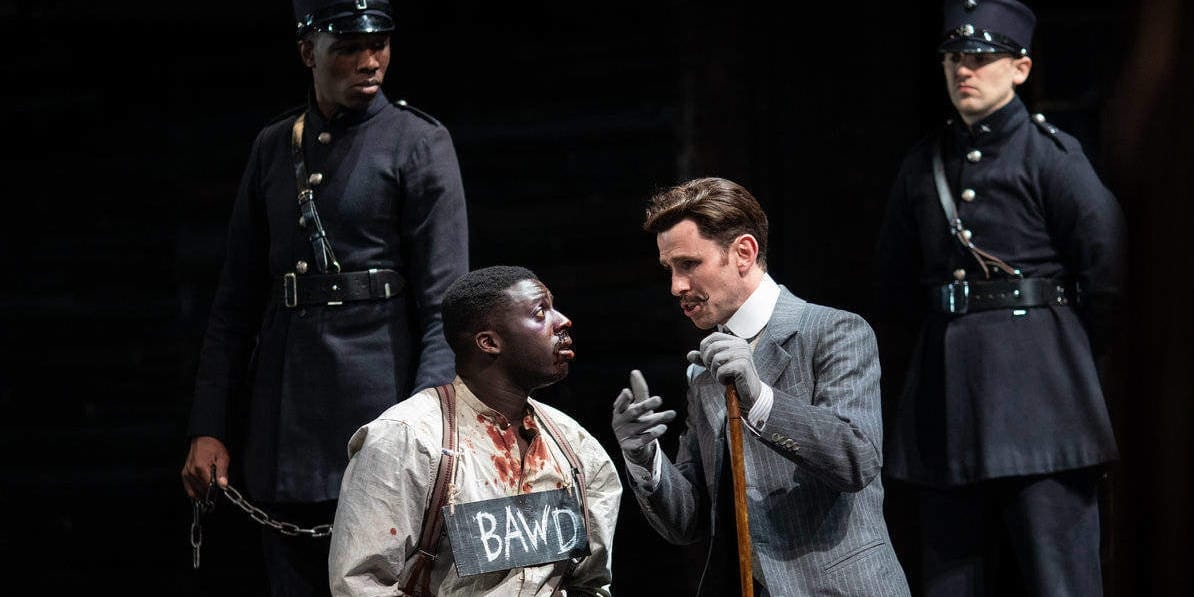Bleak morbidity, sexual exploitation, disloyalty, deception and injustice are, rather unconventionally, all sewn together by Shakespeare’s comedic thread in the masterpiece that is the iconic problem play, Measure for Measure.
Measure for Measure tells the story of Isabella, a virtuous nun (Lucy Phelps), trying to save her brother, Claudio (James Cooney), from execution under the offence of extramarital sex. The Duke of Vienna (Antony Byrne) hatches a plan: he leaves to return disguised as a friar in order to monitor how his deputy, Angelo (Sandy Grierson), deals with the rife bawd and sexual deviancy of the streets – for a tale so opposed to the bawdy, it is absolutely saturated with crude content. In an unsettling turn, Angelo offers Isabella a choice: she can relinquish her virginity to him in exchange for her brother’s life, or keep her chastity and condemn Claudio to die … but what, if anything, is the solution?
Gregory Doran’s interpretation is, above all else, the work of a true professional – everything ties seamlessly into the chosen 1900s Vienna setting. It is a rare joy to find a change of period that works so harmoniously with its content; Doran’s adaptation is not over done, rather, it sits nuancedly alongside the action.
A number of this cast offer absolutely outstanding performances: Antony Byrne, Sandy Grierson Joseph Arkley, David Ajao, Michael Patrick, Amanda Harris and Graeme Brookes all illustrate an absolute masterclass in how to absorb the complexities of a Shakespearian drama, remould it and produce your own constructed characters. An amalgamation of accents adds a diverse texture to the play and boosts each respective character’s traits as, for instance, there is something compellingly austere, authoritative, yet deeply disturbing in the Scottish tones of Grierson. In fact, Grierson’s entire performance is excellent; he is able to convince the audience to pity his anguish and turmoil in such a way that creates a problematic, morbid fascination with a character so horrendous in intention. Antony Byrne, with his extensive Shakespearian repertoire, is utterly sensational. Pompey (David Ajoe) and Lucio (Joseph Arkley), through their flamboyant capacity, bring the show to life; they inject a little fun; a little energy and a little hilarity into what, otherwise, would be a deeply unsettling narrative.
Where I feel like this performance is let down is in the scenes regarding the sexual advancements of Angelo. Phelps, as Grierson claws at her body, awkwardly convulses and spasms in a way that seems too false, too choreographed and, ultimately, not convincing. Following this moment, which comes after Isabella learns of her brother’s sentence and the sexual bargaining that Angelo proposes, Phelps offers up a monologue which, to me, misses the mark emotionally. A smile, even though it can be a sign of exasperation, disbelief or even resentment, does not and will never fit this circumstance. Overall, there appears to be a detachment between the lines of Isabella and the rest of the scene thus rendering what should be poignant moments disappointingly flat. Similarly, moments of comedic brilliance, that are so wonderfully crafted by Ajao, fizzle out at the reciprocation of Claire Price. By no means does this define their entire performance but, in a cast laced with such sensational talent and Shakespearian sensitivity, these instances unfortunately let it down. A monologue or soliloquy should never be detached from the scene within which it occurs – context is integral!
Such acting, when accompanied with such a sophisticated technical team, creates a production that is an absolute privilege to attend. Small touches such as the upstage, double-sided mirrors cleverly add a multiplicity of perspective; everyone can see everyone and everything… including a reflection of the audience. Consequently, as is the intention of a problem play, we are drawn into this challenging world of wayward morality. This production is a masterclass in performance, dramatisation, nuanced adaptation and a set and soundtrack that, put simply, just works. It is, therefore, such a shame that the conviction is lost at moments but, nonetheless, this version of Measure for Measure can only be seen as a true work of art.

